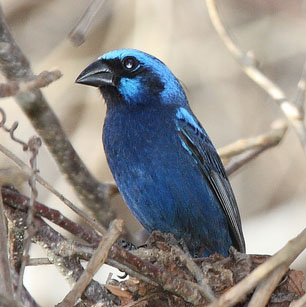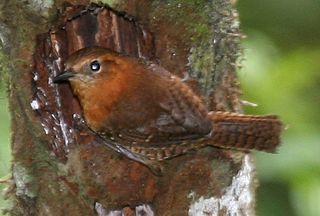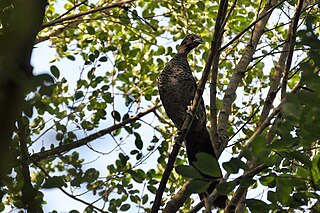
The grey-headed chachalaca is a member of an ancient group of birds of the family Cracidae, which includes chachalacas, guans, and curassows. It is found from Honduras to Colombia.

The little chachalaca is a bird in the family Cracidae, the chachalacas, guans, and curassows. It is found in Brazil, French Guiana, Suriname, Guyana, Venezuela and possibly Colombia.

The plain chachalaca is a large bird in the chachalaca, guan and curassow family Cracidae. It breeds in tropical and subtropical environments from mezquital thickets in the Rio Grande Valley in southernmost Texas, United States to northernmost Costa Rica. In Central America, this species occurs in the Pacific lowlands from Chiapas, Mexico to northern Nicaragua and as a separate population in Costa Rica, where its range is separated by a short distance, as a disjunct population.

The blue bunting is a species of passerine in the family Cardinalidae, the cardinals or cardinal grosbeaks. It is found in Belize, El Salvador, Guatemala, Honduras, Mexico, and Nicaragua.

The ocellated quail is a species of bird in the family Odontophoridae, the New World quail. It is found in El Salvador, Guatemala, Honduras, Mexico, and Nicaragua.

The Chaco chachalaca is a species of bird in the family Cracidae, the chachalacas, guans, and curassows. It is found in Argentina, Bolivia, Brazil, Paraguay, and possibly Uruguay.

The rufous-headed chachalaca is a species of bird in the family Cracidae, the chachalacas, guans, and curassows. It is found in Colombia, Ecuador, and Peru.

The chestnut-winged chachalaca is a species of bird in the family Cracidae, the chachalacas, guans, and curassows. It is endemic to Colombia.

The speckled chachalaca is a species of bird in the family Cracidae, the chachalacas, guans, and curassows. It is found in Bolivia, Brazil, Colombia, Ecuador, and Peru.

The West Mexican chachalaca is a species of bird in the family Cracidae, the chachalacas, guans, and curassows. It is endemic to Mexico.

The buff-browed chachalaca is a species of bird in the family Cracidae, the chachalacas, guans, and curassows. It is endemic to Brazil.

The rufous-bellied chachalaca is a species of bird in the family Cracidae, the chachalacas, guans, and curassows. It is endemic to western Mexico.

The tody motmot is a species of near-passerine bird in the motmot family Momotidae. It is the only species placed in the genus Hylomanes. It is found in Belize, Colombia, Costa Rica, El Salvador, Guatemala, Honduras, Mexico, Nicaragua, and Panama.

The spot-breasted wren is a species of bird in the family Troglodytidae. It is found in Belize, Costa Rica, El Salvador, Guatemala, Honduras, Mexico, and Nicaragua.

The rufous-browed wren is a species of bird in the family Troglodytidae. It is found in Central America from Mexico south into Nicaragua.

The white-bellied wren is a species of bird in the family Troglodytidae. It is found in Belize, Guatemala, Honduras, and Mexico.

The East Brazilian chachalaca is a species of bird in the family Cracidae, the chachalacas, guans, and curassows. It is endemic to eastern Brazil.

The scaled chachalaca is a species of bird in the family Cracidae, the chachalacas, guans, and curassows. It is endemic to Brazil.

The chestnut-headed chachalaca is a bird in the family Cracidae, the chachalacas, guans, and curassows. It is endemic to Brazil.

The Central American dry forests ecoregion, of the tropical and subtropical dry broadleaf forests biome, is located in Central America.























